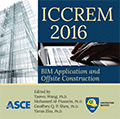International Conference on Construction and Real Estate Management 2016
Urban Land Use Change and Its Effect from the Perspective of Urban Niche
Publication: ICCREM 2016: BIM Application and Off-Site Construction
ABSTRACT
Urban expansion has led to the land use/cover change along with the continuously human colonization. The production and development of biological material has influenced by land use change. In recent years, more and more researches have been done by scholars as it has become a serious issue concerning the resource and environment damage. In this paper, urban land use change has been taken as the core problem based on the niche theory, and the land use change and its ecological effect research framework has been put forward by analyzing the definition and connotation of urban ecological niche. It analyzed the state and efficiency of resources and land and took Shanghai as an example for empirical research.
Get full access to this chapter
View all available purchase options and get full access to this chapter.
ACKNOWLEDGMENTS
We would like to thank the Project of philosophy and social sciences in Guangdong Province (project number GD14CGL02), the Project of science and technology for local universities in Guangzhou city (project number 1201420951) and the Young Research People Foundation in Yangcheng 2016 of Guangzhou Social Scineces Assosiation (project number 16QNXR20) for supporting this research.
REFERENCES
Chen, S.Y., Lin, J.P. and Yang, L.J. (2006). “City competition strategy based on the eco-niche.” Human Geography, (2), 72–77. (in Chinese).
Cheng, J., Yang, K., Zhao, J. and Wu, J.P. (2009). “Impact assessment of land use change in center district of Shanghai based on ecosystem services value.” China Environmental Science, 29(1), 95–100. (in Chinese).
Cui, X.Z. and Wang, X.T. (2014). “Urban land use change and its effect of social metabolism: a case study of Shanghai City.” China Land Science, 28(12), 39–46. (in Chinese).
Cui, X.Z. and Wang, X.T. (2015). “Urban land use change and its effect on social metabolism: an empirical study in Shanghai.” Habitat International, 45(10), 251–259. (in Chinese).
Cui, X.Z. and Wang, Y.W. (2012). “Social and human driven mechanism of urban land expansion: case study of city of Shanghai.” China Civil Engineering Journal, 45(2), 306–310. (in Chinese).
Cui, X.Z., Wang, Y.W. and Chang, Y. (2012). “The anthropogenic factors on urban growth: an empirical quantification in China.” Advanced Materials Research, 1662–8985(518–523), 6042–6049.
Ding, S.Y. and Li, Z.H. (2006). “Analysis of the urban niche change in Kaifeng.” Act Geographic, 61(7), 752–762. (in Chinese).
Hu, C.L. and Xiao, L. (2004). “The pilot application of the niche theories and methods in the research of city.” Areal Research and Development, 23(2), 13–16. (in Chinese).
Lei, X.M. (2004). “Research on urban economic niche.” China Urban Economy, (2), 20–23. (in Chinese).
Li, X.M. and Xie, R.H. (1999). “Relationship between transportation and energy--energy consuming and saving.” Comprehensive Transportation, 10(1), 23–27. (in Chinese).
Li, Y.P. and Ge, Y.S. (2005). “Development of the riverside cities in Jiangsu based on the niche theory.” Journal of Hebei Normal University, 29(6), 631–636. (in Chinese).
Luo, W.B., Wu, C.F. and Feng, K. (2010). “Temporal-spatial features and influence mechanism of urban land economic density: an empirical study based on city panel data in Hunan Province.” Urban Studies, 17(6), 68–74. (in Chinese).
Peng, X.C., Chen, X.G. and Li, G.M. (2002). “City growth management and urban ecological planning.” China Population, Resources, and Environment, 12(4), 24–27. (in Chinese).
Qi, X.H., Mao, J.X. and Cheng, H. (2007). “Study on optimizing strategies of city space basing on niche theory: a case in Zengcheng.” Planners, 23(2), 89–91. (in Chinese).
Qian, H. and Zhang, D.L. (2006). “On organization evolution mechanics basing on organization niche.” Journal of Zhejiang University, 36(2), 20–26. (in Chinese).
Wang, L.X., Ren, Z.Y. and Li, X.Y. (2004). “Assessment and analysis on ecological niche amenity of the main cities in Shanxi province.” Journal of Arid Land Resource and Environment, 20(5), 6–9. (in Chinese).
Wang, Y. and Li, G.B. (2002). “Ecological niche theory and its application in the research of small town development.” Urban Problems, (6), 13–16. (in Chinese).
Zhang, J., Ma, C.H., Wang, Q.M. and Ji, W.W. (2012). “Analysis on dynamic land use change in Hanzhong city.” Research of Soil and Water Conservation, 19(2), 112–116. (in Chinese).
Zhang, J.Q. and Jin, Q. (2007). “Theory of ecological niche and its application in the ecological city studies in China.” Journal of Shanxi Teachers University, 21(1), 103–108. (in Chinese).
Information & Authors
Information
Published In
ICCREM 2016: BIM Application and Off-Site Construction
Pages: 1184 - 1193
Editors: Yaowu Wang, Ph.D., Professor, Harbin Institute of Technology, Mohamed Al-Hussein, Ph.D., Professor, University of Alberta, Geoffrey Q. P. Shen, Ph.D., Professor, The Hong Kong Polytechnic University, and Yimin Zhu, Ph.D., Professor, Louisiana State University
ISBN (Online): 978-0-7844-8027-4
Copyright
© 2017 American Society of Civil Engineers.
History
Published online: Aug 14, 2017
Authors
Metrics & Citations
Metrics
Citations
Download citation
If you have the appropriate software installed, you can download article citation data to the citation manager of your choice. Simply select your manager software from the list below and click Download.
